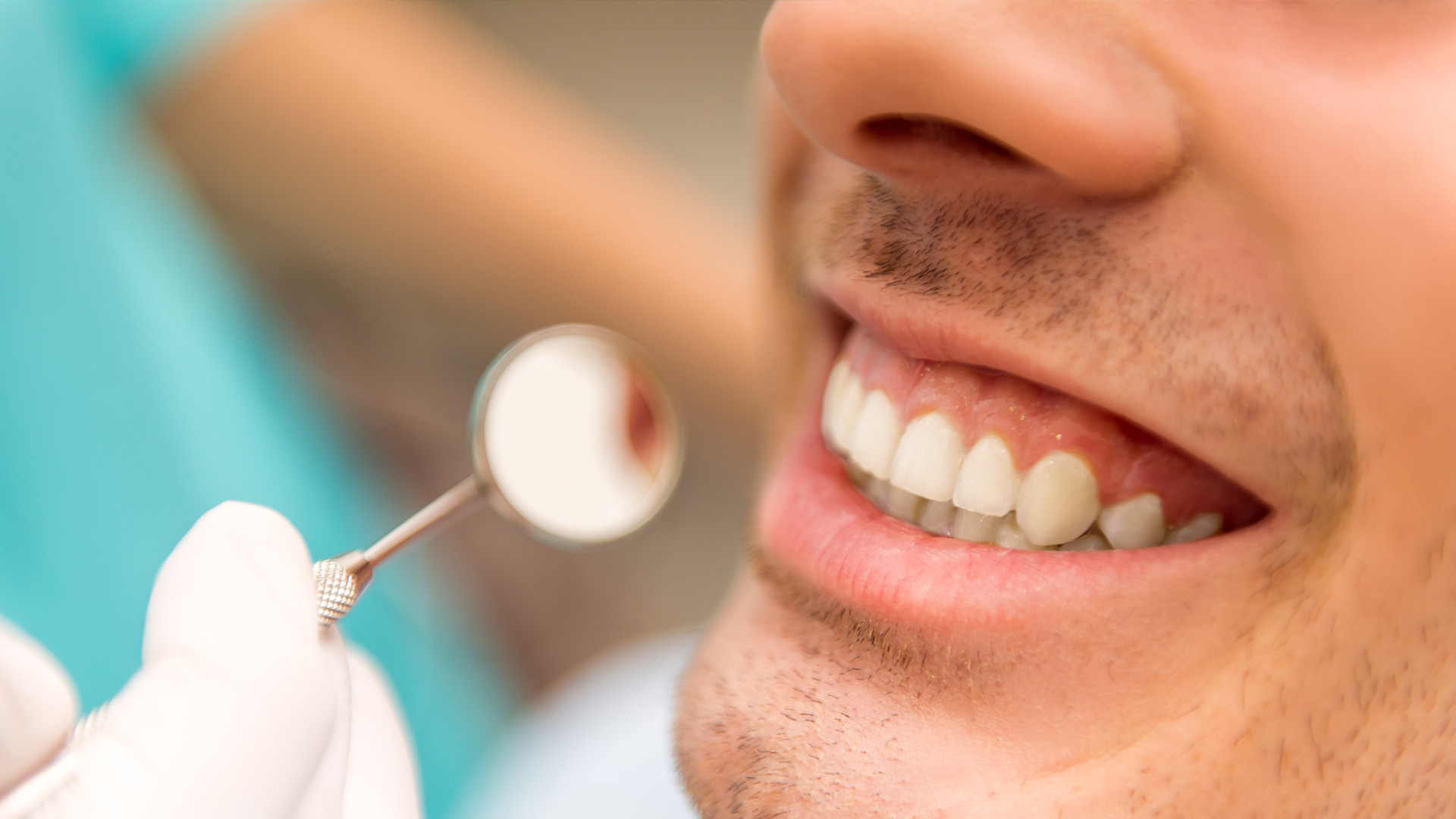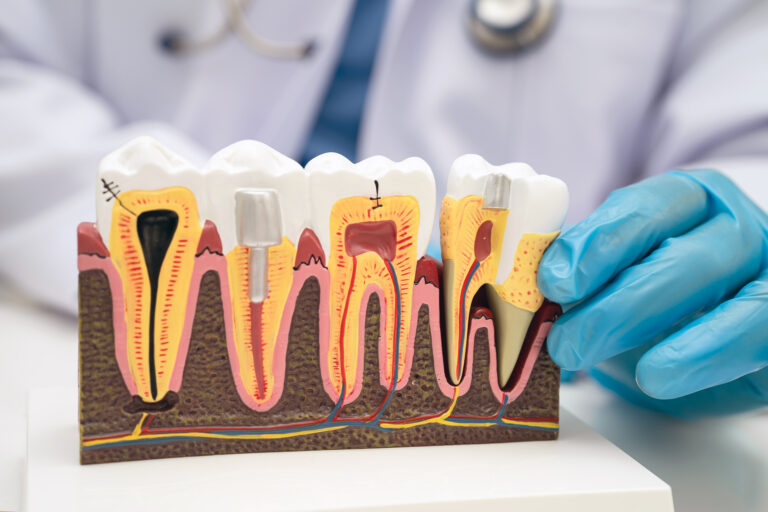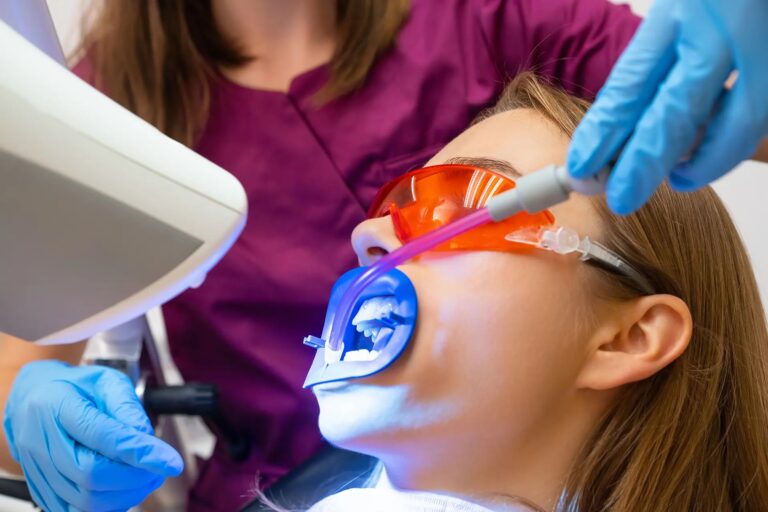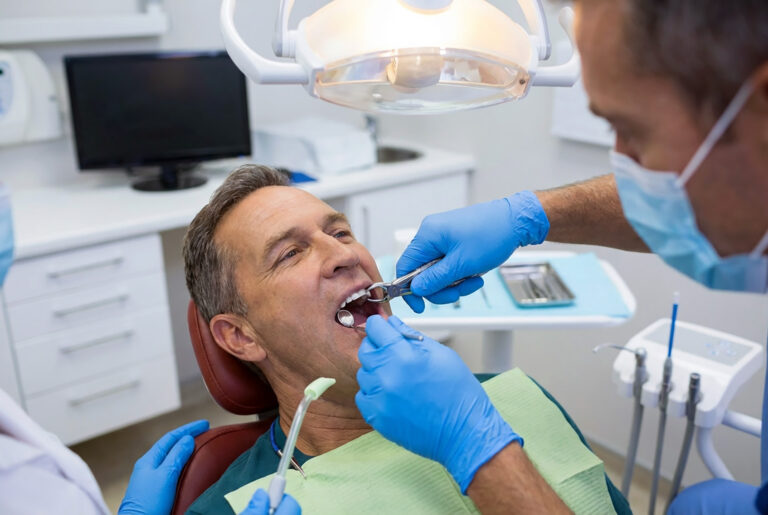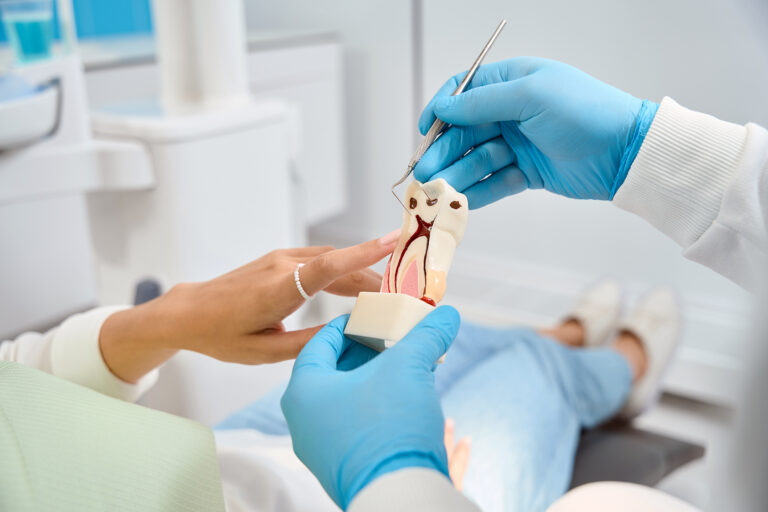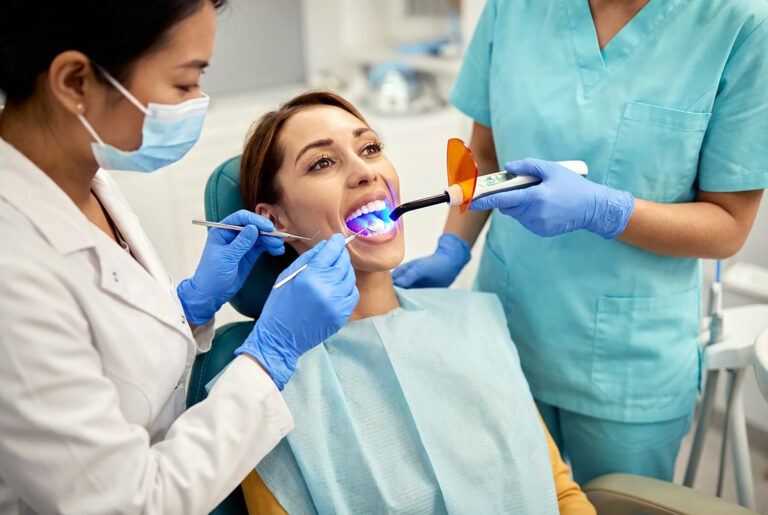Periodontal treatment effectively halts the progression of gum disease, reducing inflammation and strengthening loose teeth through proven non-surgical methods.
During your regular check-up, TEETH @ Tiong Bahru’s dentist will assess your gum health. Periodontal treatment may be provided by a dentist or a periodontist, with a periodontist specialising in advanced cases requiring surgical intervention. Gum disease is an inflammation of the gums, causing them to become swollen, bleed easily, and lose their support for the teeth as pockets form between the gum and the teeth. Untreated gum infections can lead to bad breath, tooth mobility and even tooth loss. If it is found that you have periodontal disease, our team will recommend the right gum treatment plan for you.
Periodontal disease affects millions of people worldwide, yet many remain unaware of its silent progression until significant damage has occurred.
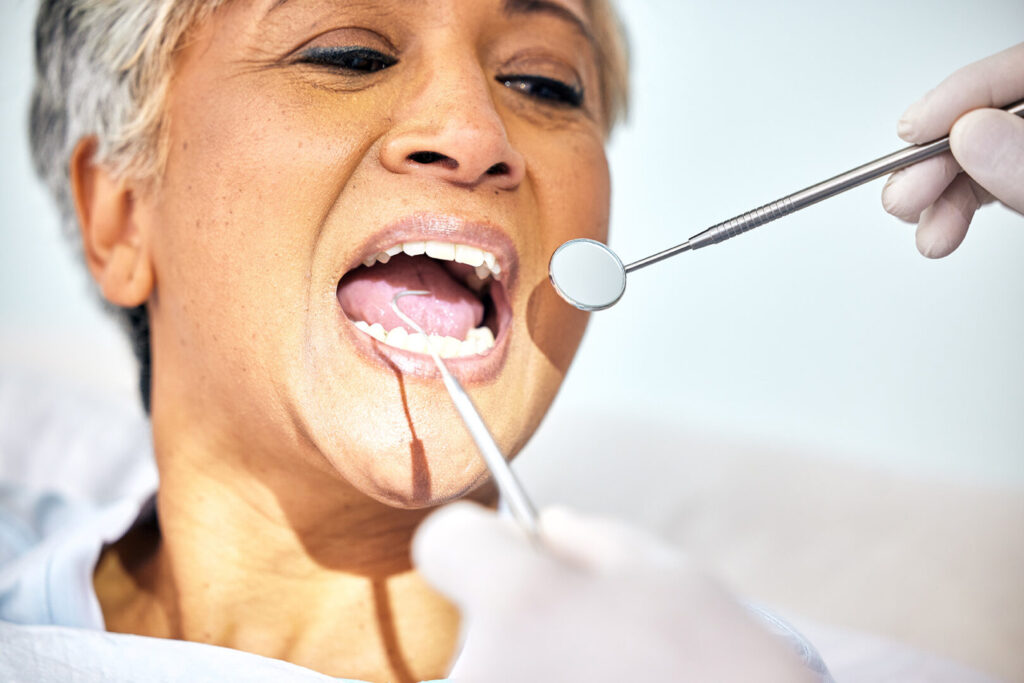
What Is Periodontal Treatment?
Periodontal treatment is a protocol designed to slow or stop the progression of gum disease. It helps stabilise teeth that feel loose, reduces gum inflammation, and often improves symptoms like bleeding and bad breath. While it doesn’t regenerate lost gum or bone tissue, it helps prevent further damage and supports the return of tooth function.
At TEETH @ Tiong Bahru, periodontal treatment focuses on removing bacterial deposits beneath the gum line and supports healing. By utilising advanced cleaning techniques and providing patient education, our non-surgical approach often eliminates the need for more invasive procedures.
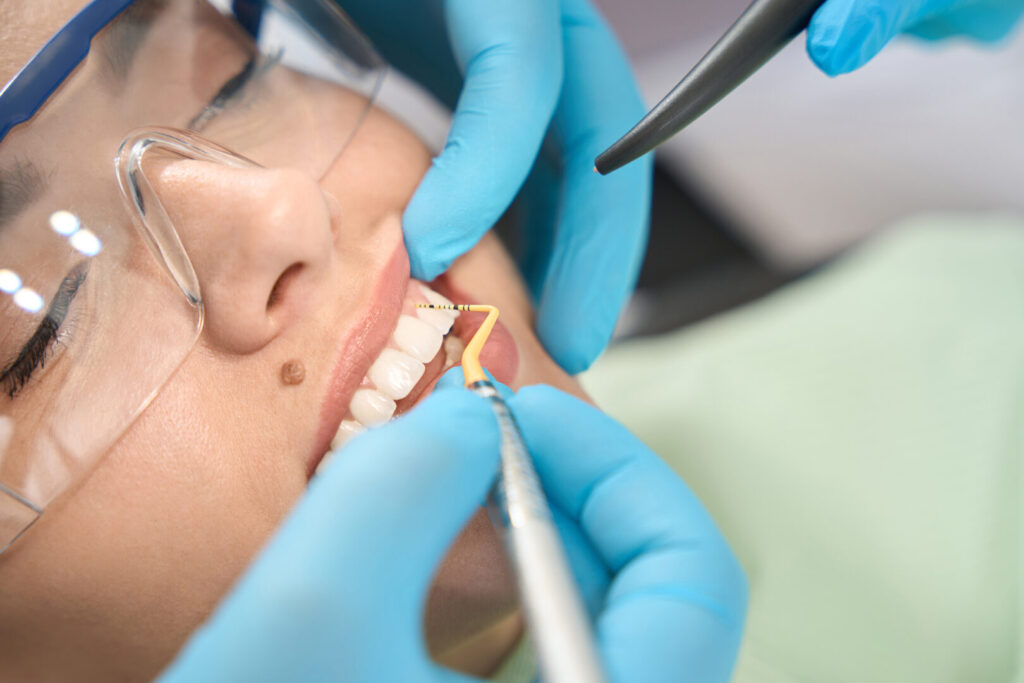
What Are The Stages of Periodontal Disease?
Periodontal disease progresses in stages, starting with gingivitis, advancing to periodontitis, and eventually leading to advanced periodontitis. Each stage brings increasing symptoms, such as gum bleeding, recession and tooth instability. Without treatment, the disease can destroy the bone and tissue that support the teeth.
Systemic conditions such as diabetes and heart disease can worsen periodontal disease. Understanding its progression helps ensure timely intervention and more effective outcomes.
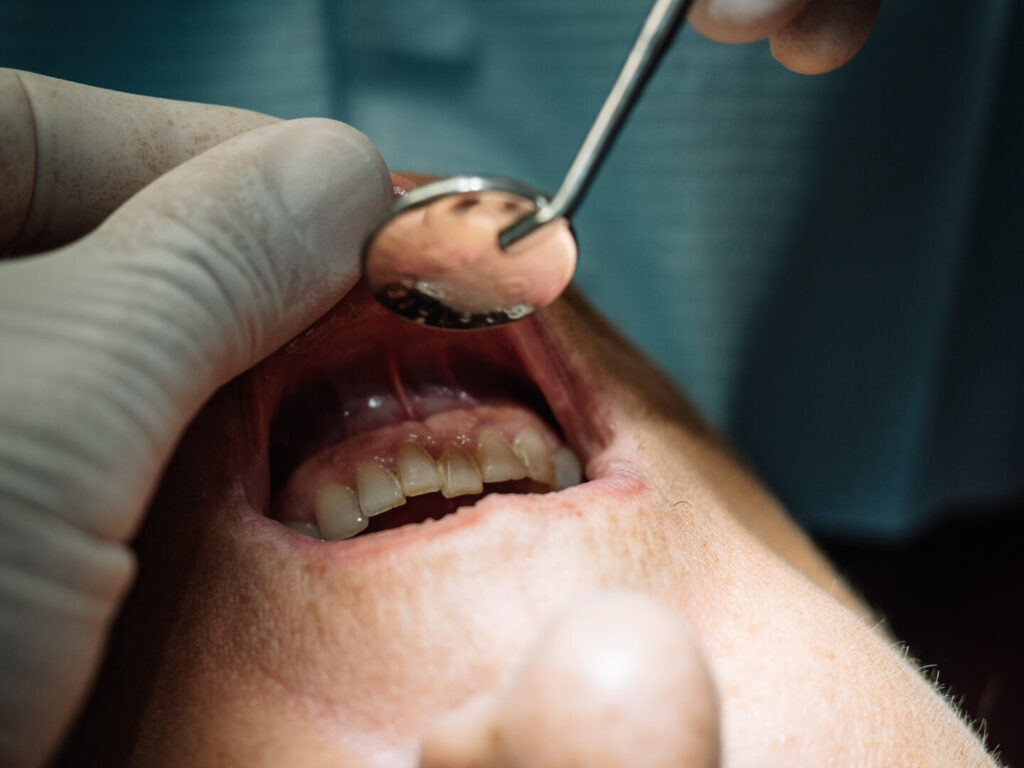
Causes and Risk Factors of Gum Disease
Gum disease typically stems from the buildup of plaque and tartar due to poor oral hygiene. This creates an environment where bacteria thrive, triggering an inflammatory response that damages gum tissue and bone.
Other factors can also increase your risk. Smoking reduces blood flow to the gums, while poor nutrition weakens the body’s defences. Health issues like diabetes, hormonal changes, genetic predisposition, and chronic stress can also contribute to gum disease.
Identifying and addressing these risk factors play a crucial role in preventing disease and maintaining oral health.
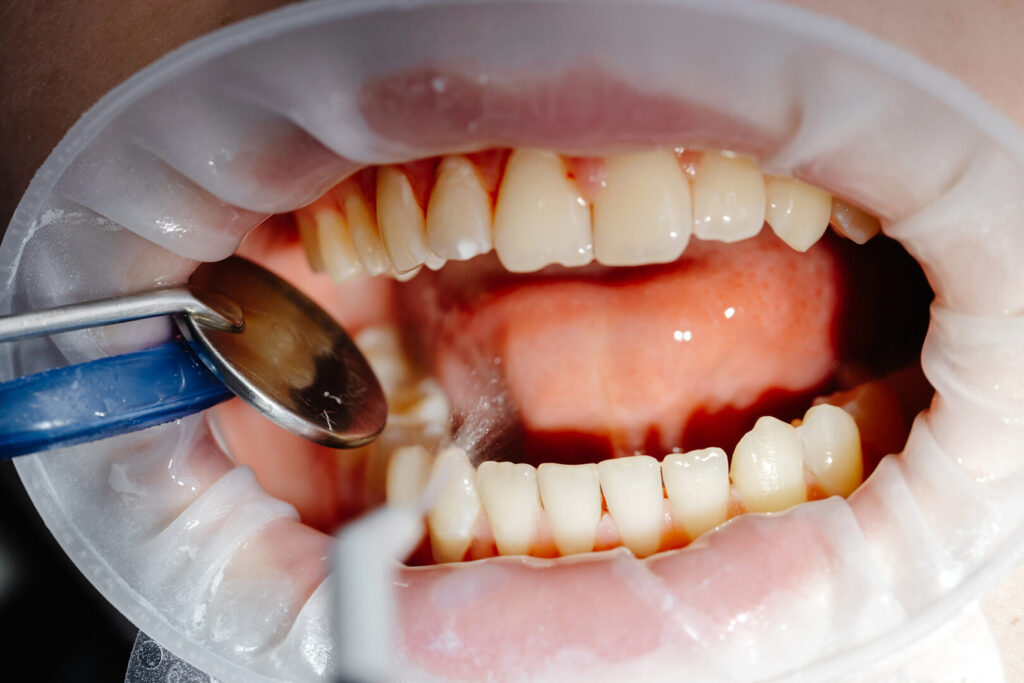
Recognising the Signs: Symptoms and Diagnosis
Symptoms of gum disease typically begin as gingivitis, characterised by red, swollen gums that bleed during brushing or flossing. At this stage, the damage is still reversible with proper care. Persistent bad breath and receding gums are also common indicators. As the condition progresses, symptoms can include loose teeth and changes in bite alignment.
When gingivitis progresses to periodontitis, the infection spreads below the gum line, creating pockets between the teeth and gums. These pockets become breeding grounds for bacteria, perpetuating the condition. Without professional periodontal disease treatment, these pockets deepen, leading to bone loss and eventual tooth instability.
The bacterial species involved in advanced periodontal disease are particularly aggressive, producing enzymes that directly attack gum tissue and bone. This is why simple brushing and flossing alone cannot resolve established periodontal disease. Professional intervention through comprehensive periodontal treatment becomes necessary.
If you notice these signs, schedule a dental check-up promptly. Your dentist will examine the gums, measure pocket depths, and may take X-rays to assess bone loss. Early diagnosis enables effective treatment, helping preserve your teeth and protect your overall oral health.
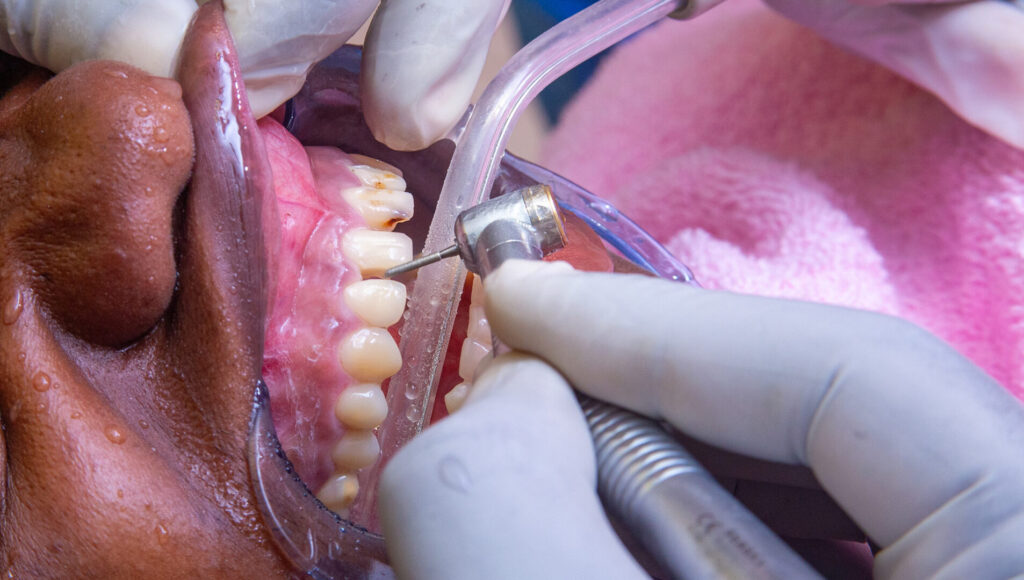
Preparing for Periodontal Treatment
If you have been diagnosed with gum disease, your dentist may recommend a tailored periodontal treatment plan to address the condition and restore your oral health. Preparing for periodontal treatment starts with understanding the procedures involved and what you can expect throughout the process. Your dentist will explain the recommended treatment plan, which may include nonsurgical methods, such as scaling and root planing, to remove plaque and tartar from below the gum line, or more advanced options, such as guided tissue regeneration, if necessary.
Before your treatment begins, your dentist may advise you on the importance of maintaining excellent oral hygiene at home. This includes brushing and flossing regularly to minimise bacterial buildup and support the healing process. You may also be asked to make specific lifestyle adjustments, such as quitting smoking or improving your diet, to enhance the effectiveness of your treatment.
Your dentist will discuss each step of the procedure, answer any questions you may have, and ensure you are comfortable with the plan. Follow-up appointments are an essential part of the process, allowing your dentist to monitor your progress and make any necessary adjustments to your treatment. By being well-prepared and informed, you can approach your periodontal therapy with confidence and achieve the best possible outcome for your gum health.
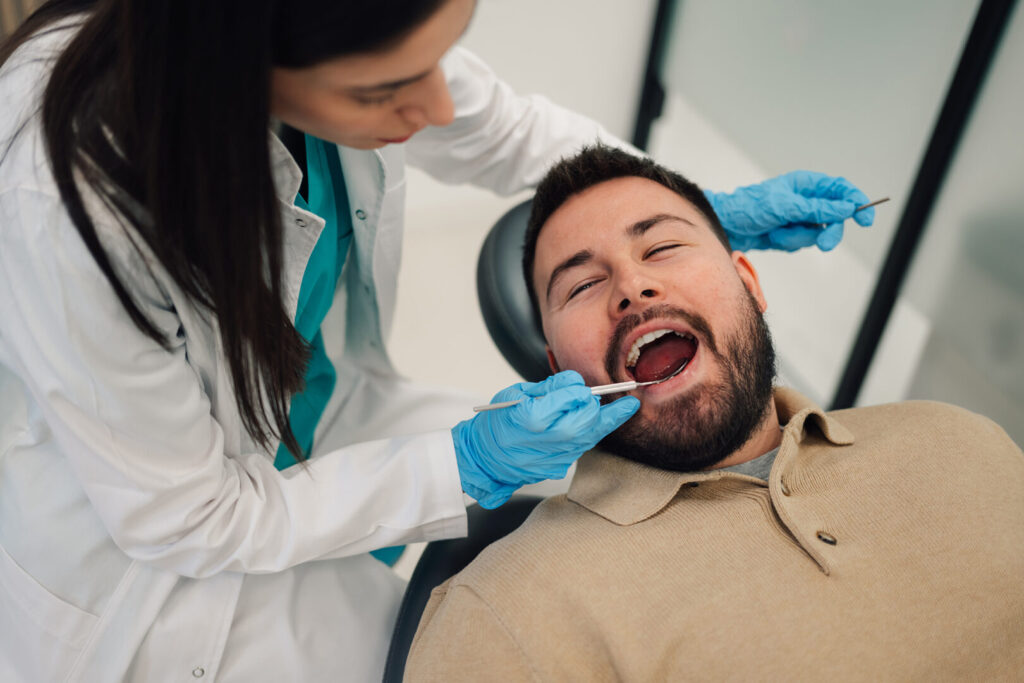
Nonsurgical and Surgical Treatment Options
The treatment options for gum disease are tailored to the severity of your condition and your individual needs.
For early or mild cases of gum disease, your dentist may recommend nonsurgical approaches such as scaling and root planing. This deep cleaning procedure targets plaque and tartar deposits below the gum line, helping to eliminate infection and reduce inflammation. Scaling and root planing is often effective in halting the progression of gum disease and restoring gum health when combined with good oral hygiene practices at home.
Restoring the health of bone and gum tissue is a vital part of comprehensive periodontal therapy, especially in cases where gum disease has caused significant damage. If you have experienced bone loss or gum recession, your dentist may recommend advanced procedures to repair and regenerate these essential structures.
If your gum disease is more advanced, surgical interventions may be necessary to address deeper pockets and significant bone loss. Procedures such as pocket reduction surgery aim to reduce the depth of pockets around your teeth, making it easier to keep these areas clean and free from bacteria. Guided tissue regeneration is another surgical option that encourages the regrowth of bone and gum tissue lost to disease, using specialised membranes or grafts to support healing.
Your dentist will carefully evaluate your oral health and discuss the benefits and risks of each treatment option.
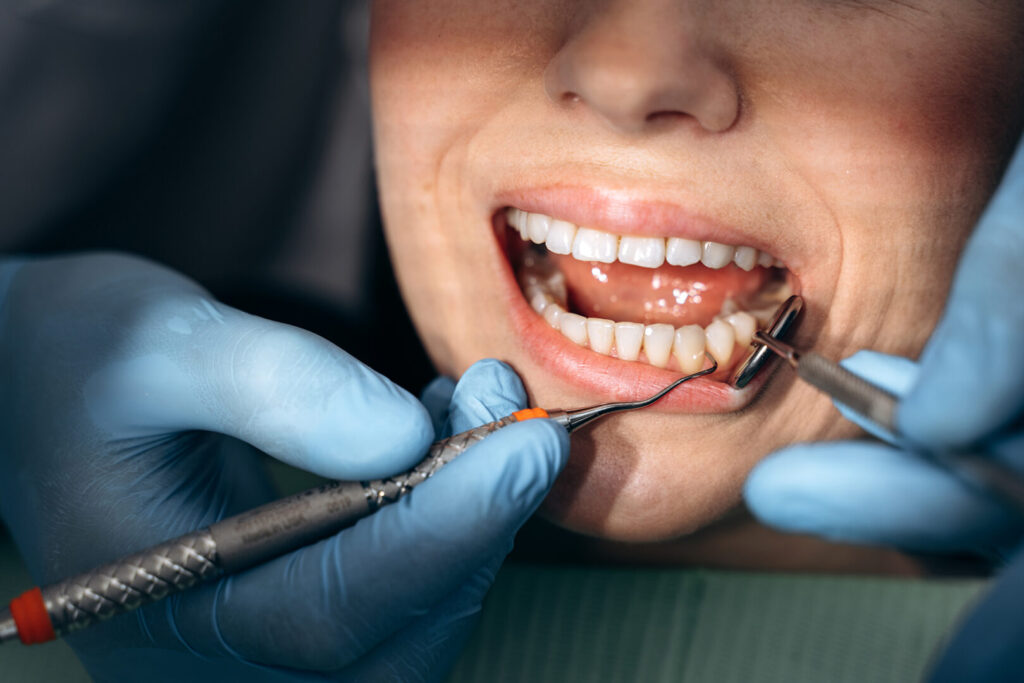
Gum Treatment Process
The gum treatment process begins with a local anaesthetic, which numbs just the tooth or area in question, ensuring a pain-free procedure. Our clinic always applies a surface numbing gel before giving the local anaesthetic injection to provide almost pain-free analgesia. If you have any concerns regarding analgesia, please do let us know so that we can make the experience as anxiety-free as possible.
The first course of periodontal treatment is carried out over two visits, each lasting 45 to 60 minutes. The local anaesthetic is applied to one side of the mouth, and the dentist may numb the upper and lower teeth on that side. Once numb, a thorough measurement of the state of your gums – a ‘Six Point Pocket Chart’ – is carried out. This provides us with a numerical representation of the depth of the periodontally affected pockets around your teeth.
Our dentist will then clean the tooth surfaces below the gum line to remove plaque, calculus and bacteria. These issues cause the gums to be inflamed and the pockets to grow. The gum treatment cleaning is done using carefully calibrated ultrasonic equipment and is followed by hand instrumentation. Lastly, the pockets are irrigated with an antimicrobial solution, which helps promote healing following the treatment.
This process is repeated on the opposite side in the subsequent session.
The precision involved in professional periodontal treatment cannot be overstated. Each tooth surface is meticulously cleaned, with special attention paid to areas where bacteria typically accumulate. Ultrasonic scaling removes hardened deposits that cannot be removed through regular brushing, while hand instrumentation ensures the complete removal of bacterial biofilms.
Following the deep cleaning, antimicrobial irrigation flushes out loosened debris, reduces bacterial load, and delivers therapeutic agents directly to the affected areas. This comprehensive approach addresses both the immediate infection and creates conditions favourable for healing.
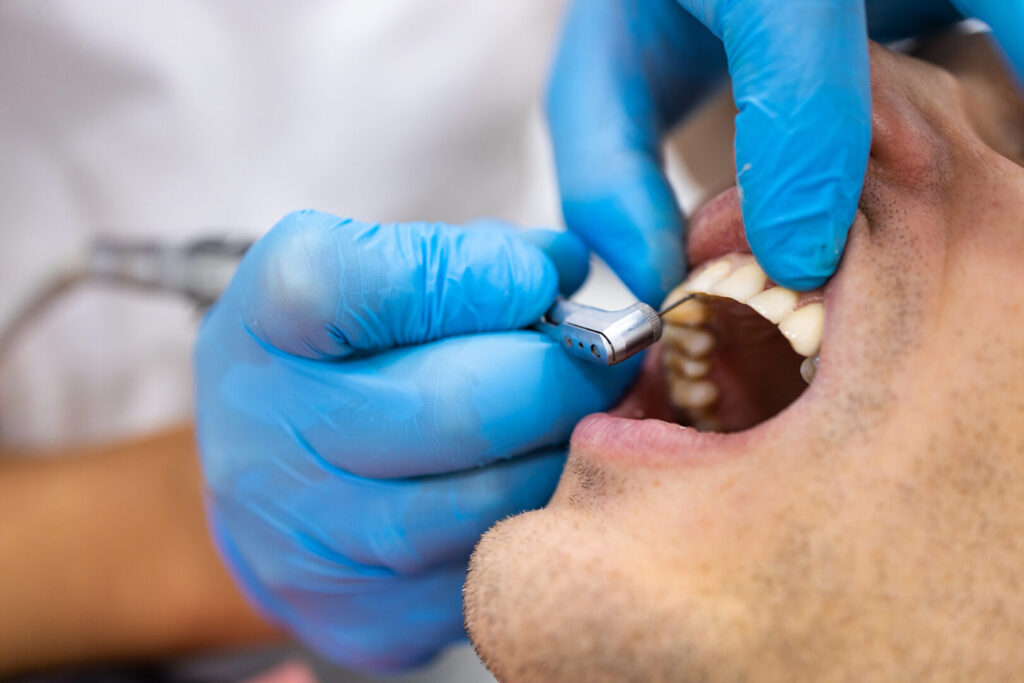
Post-Treatment Care and Ongoing Maintenance
Following periodontal treatment, patients may experience mild soreness or sensitivity that typically subsides within a few days. To ease discomfort and promote healing, analgesics, mouthwash, and a specialised toothpaste may be prescribed. Good home care is vital during this period. Your dentist will provide personalised advice on brushing techniques, rinsing protocols and dietary adjustments to support gum health and recovery.
Healing unfolds gradually over several weeks, with inflammation decreasing and gum tissue reattaching more securely to the teeth. Bleeding usually lessens significantly within the first week, and gums begin to feel firmer. Lifestyle habits and oral hygiene remain key to the treatment’s success, so your dentist will also review these factors to help you maintain progress.
Three months after initial treatment, a periodontal review is scheduled to assess healing and determine the next steps. If the disease is under control, a three-monthly maintenance plan is introduced, though some patients may require further treatment before entering the maintenance phase. These follow-up visits monitor pocket depths and provide ongoing care tailored to individual progress, ensuring long-term periodontal health and preventing the recurrence of gum disease.
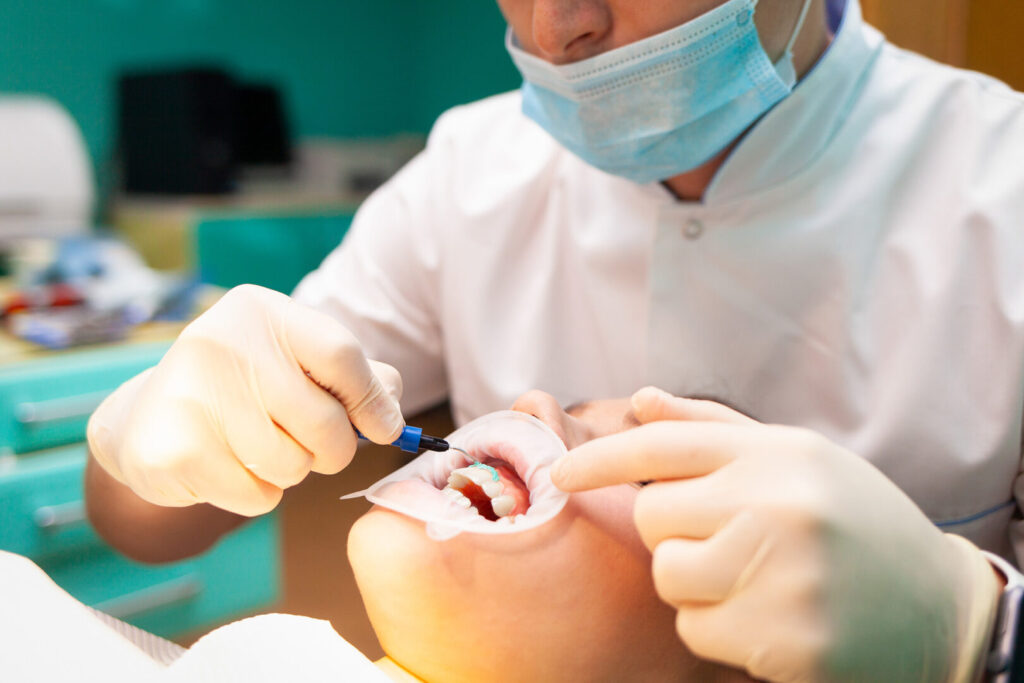
Periodontal Treatment Cost in Singapore
The cost of periodontal treatment in Singapore varies depending on the severity of the gum disease, the number of affected teeth, and the individual’s response to care. At TEETH @ Tiong Bahru, each course of non-surgical, full-mouth periodontal treatment is capped at $1,199, or a per-tooth cost at $76.30.
Non-surgical options are generally more affordable than surgical procedures, making them a practical first step for most patients. While treatment costs vary, early intervention is a worthwhile investment. Promptly managing gum disease can help prevent the significantly higher costs associated with advanced dental issues, including tooth loss and replacement.
We encourage patients to schedule a consultation to understand their personalised treatment plan and associated costs. Many insurance plans offer partial coverage for medically necessary periodontal care, and our TEETH @ Tiong Bahru team will help you navigate your benefits to maximise both value and clinical outcomes.
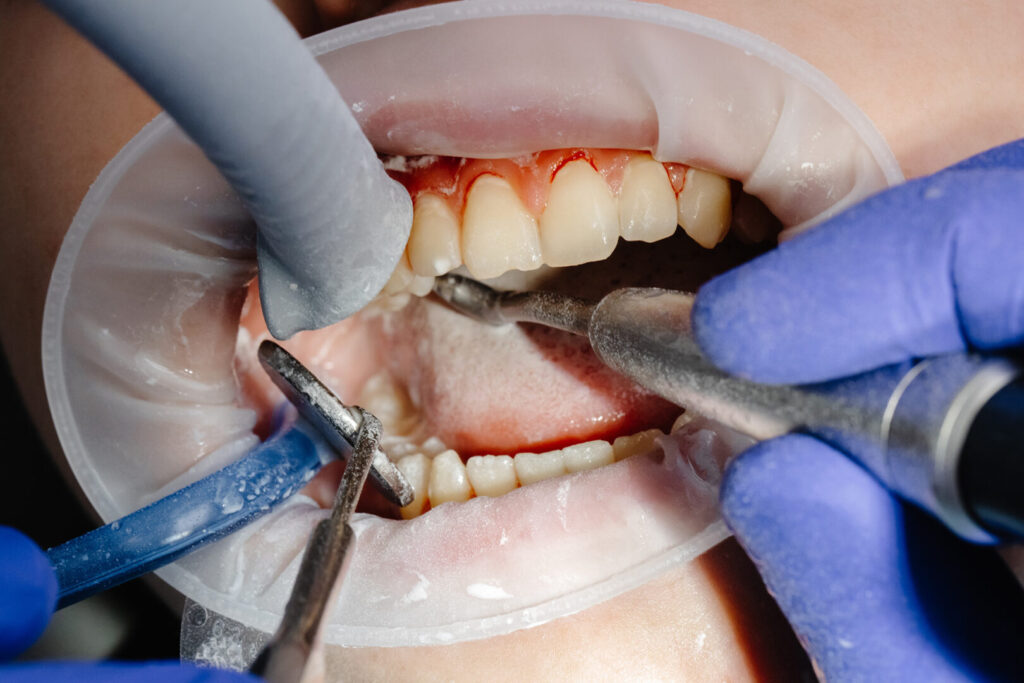
Making the Decision for Periodontal Treatment
Choosing to pursue periodontal treatment represents an investment in both immediate comfort and long-term oral health. The decision becomes clearer when patients understand that untreated periodontal disease inevitably progresses, leading to increased treatment complexity and cost over time.
Your journey toward optimal periodontal health begins with understanding your current condition and available treatment options. At TEETH @ Tiong Bahru, our experienced team combines clinical expertise with genuine care for patient comfort and long-term success. Contact TEETH @ Tiong Bahru today to schedule your comprehensive periodontal evaluation.

